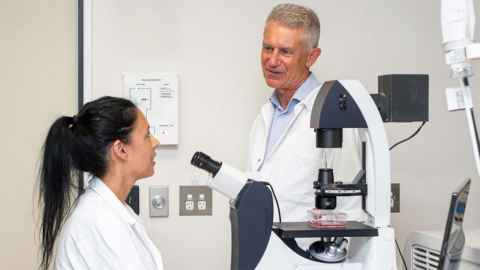Raising an army of cancer-killing cells
08 November 2021
A new frontier of research currently opening in our labs offers new hope for New Zealanders suffering from cancer.

Around 470 alumni, staff and friends have helped to fuel this research by donating $99,885 to the Immune Therapy Appeal, which launched in 2020.
Our researchers at the School of Biological Sciences want to drastically improve cancer outcomes for New Zealanders. They have uncovered a way to grow customised immune cells from a patient’s blood that can directly attack and kill their cancer cells.
The immune cells are T-cells than can kill cancer cells without harming normal cells.
Led by Professor Rod Dunbar in the Faculty of Science, the team has developed new methods to grow T-cells that can recognise molecules found only in cancer cells.
“These molecules can be very different in different patients, so a personalised approach is necessary. The next step is to test these methods in clinical trials – which is why we sought support for the establishment of the Auckland Cell Therapy Facility. This facility incorporates a rigorously controlled environment optimised for keeping human cells healthy and will enable the team to grow T-cells safely before infusing them into patients.
“Our generous supporters are helping to equip this world-class facility so it can be used for clinical trials.”
Dr Alicia Didsbury is one of the scientists contributing to this lifesaving research. She says it is philanthropic backing that is making it all possible.
“It’s thanks to these generous supporters that we are able to develop new approaches to T-cell therapy without feeling constrained by conventional thinking. This enables us to rapidly develop our best ideas for curing cancer.
“The support we have received is amazing. Sometimes the work can seem painstakingly slow – especially with the disruption due to Covid-19 – but it’s also incredibly exciting. It’s wonderful that we are now developing a facility that will enable us to test our new techniques in clinical trials.”
Rod says the future is already brighter.
“I already tell my students with some confidence that cancer will be far less of a problem for their generation than it was for their parents’ generation. At the rate immune therapy is moving, more and more cancers will be brought under control over the next two decades. And this kind of cell therapy will be part of that control.”
Media contact
Helen Borne | Communications Manager
Alumni Relations and Development
Email: h.borne@auckland.ac.nz